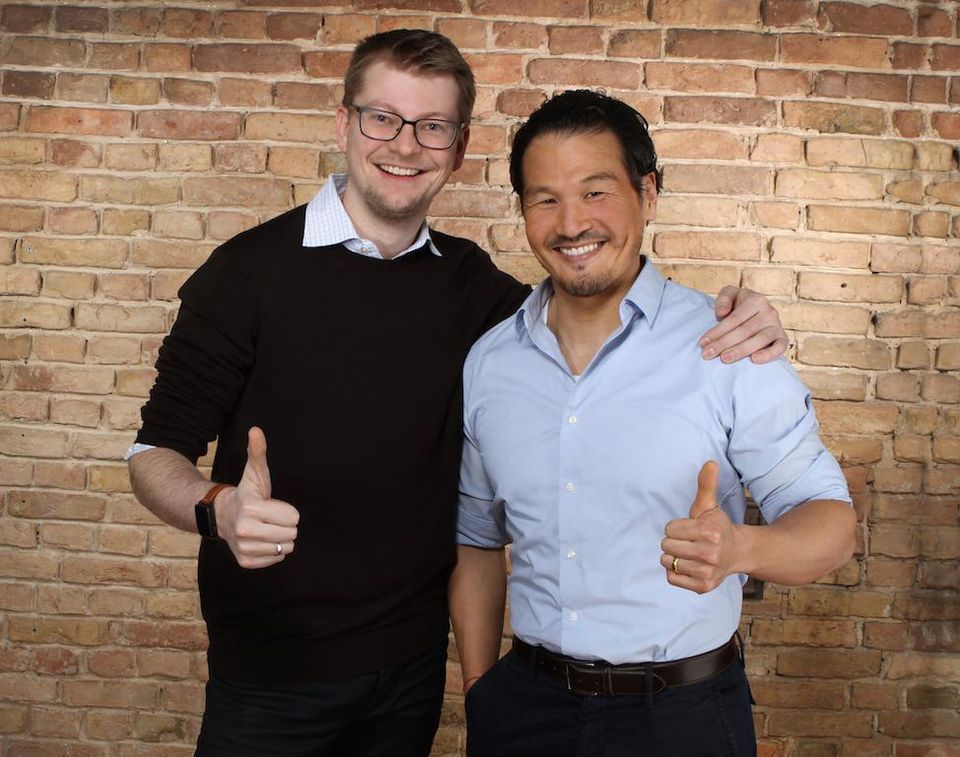Dr Richard Lohwasser and Dr Kyung-Hun Ha
The energy industry is experiencing rapid transformation thanks to new technology and high rates of innovation, which in many cases is being driven by some visionary entrepreneurs, including Dr Richard Lohwasser and Dr Kyung-Hun Ha.
The pair first met in 2015 while working for an energy company in Berlin and shared a strong belief that technology was the key to creating a great competitive advantage for both suppliers and consumers in the energy sector.
Two years later, disillusioned by the corporate greed of the large energy companies, and with a desire to prove that a fairer peer-to-peer trading model could work, they quit their jobs to start Lition AG, a Berlin-based startup that aims to transform the energy market using blockchain technology.
By directly linking green energy producers with smart consumers on the company’s energy exchange platform, Lition enables consumers to directly pay their energy producer of choice without involving a middle man, which in turn helps to make a currently closed off system more transparent, financially attractive and sustainable.
Lition customers currently save about 20% on their monthly energy bill, while producers generate up to 30% higher profits. As the producers are selected by the customer the decision-making power shifts from energy conglomerates to the consumer.
Early on in the startup process Lohwasser and Ha hit a snag when they found that the large utility companies were unwilling to take a chance and use their innovative trading solution on their customer base. So the cofounders applied for a government license to sell electricity in Germany, which was approved in April 2018.
By this stage the platform was ready to be tested on friendly customers, and the following month, having onboarded local grid operators with the help of service company BAS, Lition went live in Germany as an officially licensed energy supplier with a fully working blockchain solution, available for up to 41 million households. So how did they do it?
“While we had lots of experience in running commercial mass market blockchain applications, we learned that the underlying infrastructure is still missing,” says Lohwasser. “That’s a much bigger problem to solve, and a fundamental requirement for any sector, not just energy.”
They set about developing a next generation blockchain in collaboration with SAP that had made similar observations regarding commercial use cases.
“Our aim is to have a highly scalable, secure public-private blockchain with deletable data features, made for commercial products,” he adds. “This blockchain infrastructure is now the core of Lition and will enable many other blockchain-based applications to move out of their current niche into commercial mainstream deployment.”
While there were other energy projects trying to use blockchain in this field, none had developed the commercial application that gave Lition a major boost in terms of industry recognition. The exchange platform enables ‘location and preference-based offerings’, so that consumers can decide whether they want to receive their energy from the photovoltaic installation on their neighbor’s rooftop or a solar park from a renewable energy company.
“This is how we will democratize the energy sector,” says Lohwasser.
By cutting out intermediaries Lition’s approach is also helping to make the green energy sector more competitive. “The challenge in our sector is to go 100% green,” he says. “Roll out of green energy sources like wind and solar is desired and promoted by the public, but in practice too little is happening.”
Lition employs a team of 20 people and has a current annual turnover of $3 million, projected to reach $7 million next year. Around $5 million of external investment has been raised to date. Lohwasser says: “We managed to secure seed investors and we were finalists at many important startup competitions, such as the 2019 SET awards, where we had one of the most successful ICOs in 2019, securing two million dollars in two rounds within around half an hour.”
The company now has customers in over 160 cities and a growth target of 235,000 customers by the end of 2022. Lition also has its sights set on application expansion, connecting the blockchain energy trading solution into electric vehicle charging stations and developing a working pilot for smart meter integration. The company is also expanding overseas and recently opened offices in China and South Korea.
It is a success story born out of the vision of two entrepreneurs for a democratic future, where consumers instead of utilities decide which green power plant they want to support, and pay fair prices for their energy, with a bigger share of their money going directly to the green energy providers.
Lohwasser says: “We believe that there is a different way and I want to play my part in creating a better future in which modern technologies radically shorten the supply chain to help achieve these lower costs.
Follow me on Twitter. Check out my website.
[Source: “The German Tech Startup That’s Shifting Power From The Energy Conglomerates To The Consumer” published by Alison Coleman / Forbes.com]




